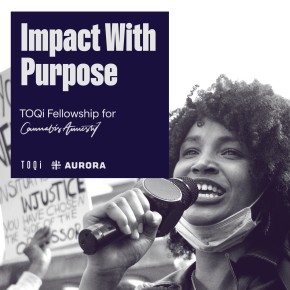In partnership with TOQi and Aurora Cannabis, Cannabis Amnesty is offering two paid summer internships, designed to create economic opportunities for people from communities harmed by decades of cannabis prohibition while increasing Cannabis Amnesty’s capacity to develop groundbreaking advocacy and programming.
This Fellowship program is focused on mentorship and skill-building around effective communication and advocacy in the not-for-profit sector, particularly as it engages with government and the for-profit cannabis industry. Learn more here: toqifellowship4ca.com
We are Cannabis Amnesty, a not-for-profit advocacy organization committed to ensuring equity in Canada’s legal cannabis space and fair treatment for those disproportionately impacted by cannabis criminalization. As lawyers, activists and academics, we are acutely aware that historically, cannabis laws were unequally enforced by law enforcement in Canada, disproportionately impacting Black and Indigenous communities. Cannabis convictions limit economic opportunities for these groups, thus further entrenching systemic racism through poverty and disenfranchisement.
As Canadians benefit and prosper from the legalization of cannabis, these groups continue to suffer. One of the central objectives of Cannabis Amnesty is to disrupt the way that systemic racism in the criminal justice system has created barriers to economic opportunity for marginalized communities.
We are proud to partner with TOQi, a Black-owned cannabis technology business, and Aurora, a global cannabis pioneer, to create the TOQi Fellowship for Cannabis Amnesty. The TOQi Fellowship is a summer internship program for ambitious young people aged 21-30 who wish to gain experience in advocacy and communications and have an interest in social justice and the not-for-profit sector in Canada.
The TOQi Fellowship is a 12-week internship program that takes place in Toronto, Ontario–the location of the headquarters of Cannabis Amnesty. Two interns will be hired. The Fellowship will run from May 16, 2022 to August 12, 2022. Fellows are expected to work exclusively on TOQi Fellowship assignments Monday through Friday from 9 AM to 5 PM (with an hour lunch break) for the duration of the internship.
This Fellowship program is focused on mentorship and skill-building around effective communication and advocacy in the not-for-profit sector, particularly as it engages with government and the for-profit cannabis industry. TOQi Fellows will be directly supervised and mentored by members of the Board of Directors of Cannabis Amnesty (Annamaria Enenajor, Stephanie DiGiuseppe and Sameena Ibrahim) with the support of TOQi CEO, Drew Henson. TOQi Fellows will also have the opportunity to engage with program partner, Aurora Cannabis, to learn more about the cannabis industry.
The 12-week program will involve training on the following aspects of building a communications strategy for not-for-profit organizations:Understanding organizational operations and the governance of not-for-profits
Over the course of the internship, TOQi Fellows will be expected to perform the following duties:
The focus will be on empowering interns to use their unique voice to advance the mission of Cannabis Amnesty while increasing the capacity of the organization to advocate and educate.
The TOQi Fellowship offers interns a generous compensation package designed to challenge the market’s chronic under-valuation of the work of people who come from marginalized groups.
I am text block. Click edit button to change this text. Lorem ipsum dolor sit amet, consectetur adipiscing elit. Ut elit tellus, luctus nec ullamcorper mattis, pulvinar dapibus leo.



On November 17, 2022, Bill C-5 received royal assent. This piece of legislation is an attempt by the Minister of Justice to address the overrepresentation of Black, Indigenous and people from marginalized communities within all aspects of the criminal justice system, but in particular, in convictions and incarceration.
Hidden within the provisions of Bill C-5 is cannabis amnesty.
Very few not-for-profit organizations can boast of having accomplished the central goal they set out to achieve. On May 5, 2018, Cannabis Amnesty launched a petition calling upon Parliament to enact legislation granting amnesty to all individuals for the offence of simple possession of cannabis. We argued that for amnesty to be effective, it must be free, automatic, and permanent.
After years of advocacy and government measures that simply did not go far enough, we finally have a law that provides true cannabis amnesty. The bill requires that all records of a conviction for simple possession of cannabis must automatically be kept separate and apart from other records of convictions by November 17, 2024, at no cost to the individual. While Bill C-5 does not style the treatment of these records as “expungements”, the record sequestration regime created by the bill will have a comparable effect of permanency, and it will be free and automatic.
The achievement of true cannabis amnesty through legislation is incredibly significant. Bill C-5 represents the culmination of the work of our organization and has a significant impact on our mission.
Our comprehensive report of Bill C-5 can be found here: chrome-extension://efaidnbmnnnibpcajpcglclefindmkaj/https://mcusercontent.com/00bd1458a14fa98eb22b526da/files/bd817699-d377-c40e-daf5-b076fc044dda/Report_on_Bill_C_5.pdf

Today, Cannabis Amnesty appears for the first time before the Supreme Court of Canada in Murray-Hall v. AGQ. In this important case, we will ask Canada’s highest court to recognize that the purpose of cannabis legalization was not just to reduce the burden of cannabis criminalization on our justice system, but also to reduce the burden on individuals with historical convictions related to non-violent cannabis offences, particularly the visible minorities, Indigenous people and those from marginalized communities who have been disproportionately harmed by cannabis criminalization. We argue that, given this broad and remedial purpose, the Quebec government should not be allowed to criminalize home cultivation of cannabis.
We would like to extend a special thank you to our pro bono counsel Ren Bucholz, representing us from Paliare Roland.
You can watch a live webcast of the hearing through the link in our bio.

This Thursday, September 15, Cannabis Amnesty will appear before the Supreme Court of Canada for the first time in Murray-Hall v. AGQ. In this case, the Supreme Court of Canada will decide whether Quebec’s ban on growing cannabis plants for personal use is constitutional.
We argue that Quebec’s ban frustrates the remedial purpose of Canada’s new cannabis law, which was to reduce the burden of cannabis convictions on individuals, particularly the visible minorities, Indigenous people and those from marginalized communities who have been disproportionately harmed by cannabis criminalization.
You can watch a live webcast of the hearing via the link in our bio.

Border crossings are tense encounters for those with cannabis records. Imagine being fined and detained by the U.S. for not having an entry waiver application for a law that no longer exists. It shouldn’t happen.

Tattoos are permanent. Cannabis charges shouldn’t be.
We recently partnered with @sistermerci at the KIND Golf Invitational to raise donations for Cannabis Amnesty. Donors had the opportunity to get a flash tattoo designed by Toronto-based tattoo artist @destroyallthetime, and their donations will help us bring justice to those unfairly impacted by cannabis prohibition.

The system is unjust. Imagine a conviction for a now-legal drug hampering your ability to get a job. Now imagine that same conviction blocking your shot at public housing. It’s an unfortunate reality that too many are facing.

Cannabis convictions can have devastating collateral consequences. Education, employment, volunteering, housing, parental rights and more are affected, limiting an individual`s ability to participate in society. It’s time to wipe the slate clean.

We advocate for justice and fairness in Canada’s cannabis laws. Thousands of Canadians continue to experience serious consequences of having a criminal conviction for cannabis-related offences. Help us make this right.

Cannabis is legal. There’s a shop on every corner. Licensed producers are cashing in. Meanwhile, an estimated 500,000 people still have a cannabis-related offence on their record. Our drug laws have progressed, but justice has some catching up to do.

The regulations of drugs in Canada is historically rooted in racism. Today, it’s seen in the disproportionate harm done to racialized communities in some of our biggest cities. This new era of cannabis needs to be one of equality.
The harm is disproportionate.

Only 2% of cannabis industry leaders are Black or Indigenous. This lack of representation is rooted in history; racialized communities have been disproportionately impacted by cannabis prohibition because of discriminatory enforcement. Together we can change this by providing opportunities to those negatively affected by prohibition
#SparkJointsSparkChange #SparkUp4Justice #RCCforjustice

Bill C-93 only suspends possession records. These records need to be deleted for good. Without complete expungement, the door is always open for convictions to be reinstated or accidentally disclosed. The current way is not enough.
